- Home
- Ben Counter
Van Horstmann
Van Horstmann Read online
Table of Contents
Cover
Title Page
Warhammer
Map
Prologue
Part One
Chapter One
Chapter Two
Chapter Three
Chapter Four
Chapter Five
Chapter Six
Part Two
Chapter Seven
Chapter Eight
Chapter Nine
Chapter Ten
Chapter Eleven
Chapter Twelve
Part Three
Chapter Thirteen
Chapter Fourteen
Chapter Fifteen
Chapter Sixteen
Chapter Seventeen
Chapter Eighteen
About The Author
Legal
eBook license
THIS IS A DARK AGE, A BLOODY AGE, AN AGE OF DAEMONS AND OF SORCERY. IT IS AN AGE OF BATTLE AND DEATH, AND OF THE WORLD’S ENDING. AMIDST ALL OF THE FIRE, FLAME AND FURY IT IS A TIME, TOO, OF MIGHTY HEROES, OF BOLD DEEDS AND GREAT COURAGE.
AT THE HEART OF THE OLD WORLD SPRAWLS THE EMPIRE, THE LARGEST AND MOST POWERFUL OF THE HUMAN REALMS. KNOWN FOR ITS ENGINEERS, SORCERERS, TRADERS AND SOLDIERS, IT ISA LAND OF GREAT MOUNTAINS, MIGHTY RIVERS, DARK FORESTSAND VAST CITIES. AND FROM HIS THRONE IN ALTDORF REIGNSTHE EMPEROR KARL FRANZ, SACRED DESCENDANT OF THEFOUNDER OF THESE LANDS, SIGMAR, AND WIELDER OF HIS MAGICAL WARHAMMER.
BUT THESE ARE FAR FROM CIVILISED TIMES. ACROSS THE LENGTH AND BREADTH OF THE OLD WORLD, FROM THE KNIGHTLY PALACES OF BRETONNIA TO ICE-BOUND KISLEV IN THE FAR NORTH, COME RUMBLINGS OF WAR. IN THE TOWERING WORLDS EDGE MOUNTAINS, THE ORC TRIBES ARE GATHERING FOR ANOTHER ASSAULT. BANDITS AND RENEGADES HARRY THE WILD SOUTHERN LANDS OFTHE BORDER PRINCES. THERE ARE RUMOURS OF RAT-THINGS, THE SKAVEN, EMERGING FROM THE SEWERS AND SWAMPS ACROSS THE LAND. AND FROM THE NORTHERN WILDERNESSES THERE IS THE EVER-PRESENT THREAT OF CHAOS, OF DAEMONS AND BEASTMEN CORRUPTED BY THE FOUL POWERS OF THE DARK GODS. AS THE TIME OF BATTLE DRAWS EVER NEARER, THE EMPIRE NEEDS HEROES LIKE NEVER BEFORE.
PROLOGUE
THE LIGHT
It was the cold that woke him. It penetrated right through him, like his flesh was gone and his bones were soaked in it.
His lungs contracted and he could not breathe. Without willing it, he was moving, his limbs thrashing. But he was held fast and could not escape, trapped beneath the ice by hands stronger than him. There was room in his mind for only one thought, which was that he was going to die down there in the merciless cold.
His head was dragged up above the surface. He gulped down air. Every muscle was convulsing with the effort of breathing.
‘Lord Teclis,’ said a voice. ‘Are you there? Do you hear us?’
Even his eyes felt frozen. They would not focus. He could see only a silvery blur in front of him.
Another thought reached him: he was alive.
‘I… I am here,’ he gasped. ‘How long?’
‘Three days,’ came the reply.
‘Thank you,’ said Teclis, as his sight swam back and the shapes in front of him became connected to disparate slices of his memory. ‘Thank you, Caradryath.’
Caradryath, of the elven Sword Masters of Hoeth, bent over Teclis and pulled him upright. The High Loremaster was immersed in a horse trough of freezing water, the best vessel for their loremaster that the attendant Sword Masters had found at short notice. With something close to fear on their faces, two other Sword Masters knelt behind Caradryath. They did not wear the high plumed helmets of their order, but they wore the rest of their gleaming silver scale armour as if about to march out from the gates of the White Tower.
‘Has the fever broken?’ said Caradryath.
Teclis leaned against the side of the trough. He could not keep his hands still and his voice wavered. Isha’s tears, he was cold. But the fact he could feel anything at all meant he had not died in that pavilion, somewhere in the heart of the half-savage land men called the Empire of Sigmar.
‘It is gone,’ said Teclis. ‘The last thing I remember, its grip was around me. It was a black hand with talons sinking into the back of my skull. I could hear it laughing as it dragged me under. But it is gone now. The cold has broken it. I will live.’
‘I had thought this would kill you,’ said Caradryath. ‘I feared that my loremaster would fall by my hand.’
‘The fever would have killed me most surely,’ said Teclis. ‘You did the right thing. And the magisters?’
‘They stand even now at vigil, loremaster.’
‘We cannot keep them waiting. Damn the fires of Hoeth! Three days! Our prisoner will be free before the kraken can swim a league! Help me, Bladelord.’
Caradryath had to help Teclis out of the icy water. Caradryath was one of the flower of Ulthuan’s youth, strong and proud, fair and tall. Teclis was like a child compared to him, his limbs skinny and his hair lank and black. A few hours before, he had been dying of a disease that the priests of Isha and Shallya could not cure. He looked like he still was.
The Sword Masters tried to dry off their loremaster, but he batted away their attentions. Teclis shrugged on his robe, embroidered with the sigils and marks of rank from the White Tower of Saphery, over wet skin. Caradryath helped him don the Silver Crown, a tall helm of silver and gold with a fat uncut ruby set in its brow, and Teclis tottered under the weight of it. The Bladelord of the Sword Masters let the loremaster lean on his shoulder and helped him out of the pavilion.
There were two Teclises. One was the elf – more properly the boy, for he had the stature and weakness of a boy, skinny and shivering. It was this Teclis who limped and coughed as Caradryath pulled aside the entrance flap of the pavilion and let the sun shine in. This Teclis blinked and screwed up his eyes, like a creature that had lived all its life in a cave.
The second Teclis existed far away, in the endless lands of the aethyr. The winds of magic that suffused the world blew in from the aethyr, a realm not of the senses but of the emotions and the mind, an endlessness of disconnected thoughts, concepts, ideas, wishes, love and hate, and souls lost and drifting. Everyone had another self in that realm, but only a wizard could communicate with that self, could use that self as a lens through which he could focus the winds of magic. Teclis knew his aethyr-self well. The two were close to becoming one. What one felt, the other knew. What one knew, the other perceived as rushes of emotion or plunging depths of fear. That was why Teclis was the High Loremaster. That was why the future of magic itself was in his feeble hands.
The senses of his aethyr-self could see the pulsing magic of Caradryath’s heart. That was life, which had its own magic. The celestial power that shone down on him from the sun blinded his aethyr-eyes, for he had been cut off from its prophetic power just as his real self had been cut off from sunlight. Even the arms and armour of his Sword Masters had magic bound in them through the process of their forging, from the concentration and skill of the forgemasters of Saphery, winding through them like filaments of an unseen alloy. Teclis let these senses merge with his own so the same pair of eyes saw both the sun in the sky, and the great well of potential that burned in the heavens, illuminating everything that might yet be.
He could not tell the future. Not here, not now. The paths that diverged led to outcomes too great to be chosen between. Competing futures clamoured at his aethyr-self’s mind, and there would be no prophecies made today.
Teclis’s pavilion was one of a ring of tents and temporary lodges set up around a great smouldering crater in the ground. It was a clear day and as he blinked away the sun’s glare Teclis could see the outskirts of the greatest city of men – Altdorf, the capital of Sigmar’s Empire. Already that city was choking the grand River Reik with bridges and quays, and there was no mistak
ing its future. It would grow, become greater, with all the good and ill that entailed. He could see that future, at least. Altdorf would be at once a jewel and a cesspit, a throne of glory and a swamp of corruption. That was why what had to be done, had to be done here. Only a city with a future that great could cope with the paths of fate that would divide under it. Only Altdorf could survive what Teclis was about to do to it.
Teclis heard the beast before he saw it. The monstrous heave of its breathing was like the sound of rocks grinding deep beneath the earth. The ground shuddered with it. The creature roared, the sound like a winter’s gale, and a plume of chill vapour billowed up into the sky.
At the crater’s edge stood a forge of heaped-up boulders, glowing as shirtless dwarf attendants worked the bellows. They were all muscular and smeared with soot, looking like they had just come from the depths of the Worlds Edge holds. They hauled great links of iron from the fires, which glowed orange as they were hammered into sections of an enormous chain. Atop the forge stood Marius, one of the first pupils Teclis had ever taken from the lands of men. Marius was close to mastering fire magic, and he called down the winds to fill the forge with an inferno that burned deeper than any mortal flame. Beside the forge worked Auroc, the Gold mage. The magic Teclis had seen in the armour of his Sword Masters was the same that coursed through Auroc then, as with a series of gestures he wove the links of the chain together and struck into them dwarf-taught runes of strength and scorn.
Teclis had tutored both men himself. Without him their talent at magic would have meandered astray into the petty corruptions of hedge wizards as they weaved what spells they could, ignorant of the dangers. Without Teclis the whole of human magic would have continued in that way, and even the mightiest of human wizards would have been nothing more than playthings for the daemons who lurked in the aethyr. The great incursions of Chaos, halted at the Empire’s northern edges, had found their ways into the lands of men through the minds of such ignorant wizards. Teclis’s task was to make sure they could never use such an invasion route again.
Teclis saw then two men. Like him, each of his students had an earthly form, and one that walked in the aethyr. The two were not on speaking terms as his were, for the human soul could not accept the understanding of magic as completely as a high elf. But he saw ghosted over his students’ simple trappings the robes and implements of great orders of magic, traditions of learning that would become great institutions guarding the world from the worst of its corruptions.
‘My lord Teclis!’ cried Marius as he saw Teclis emerging from the pavilion. ‘You yet live!’ The Bright wizard clambered down from the stones of the forge. He wore the rust-red robes of his fledgling order and to Teclis’s eye they flamed bright, surrounding Marius in an orange halo. His ruddy beard was twisted into braids and aethyr-fire lit each one like the wick of a candle, bathing his face in flickering light. He clasped Teclis’s hand in his own. ‘We feared for you, loremaster.’
‘The aethyr has plans for me yet, Marius,’ said Teclis. He waved away Caradryath and took his weight on his own feet. He stayed upright, just. His legs were as weak as a newborn’s. ‘I cannot die now. Not when we have work to do.’
‘It has been difficult,’ said Marius. ‘I do not believe we could keep it chained for much longer. Though it pains me to admit such weakness, the flames of the aethyr scorch me. They burn my soul. I will burn out before I give in, but burn out I will soon without your help.’
‘It will not be you,’ said Teclis, ‘who burns this day.’ He turned to Caradryath. ‘My armaments,’ he said. The Sword Master bowed and headed back to the pavilion.
Another of Teclis’s students came into sight over the lip of the crater. His dark-green robes were smeared with earth and soot from the crater and his straggly dark hair was twined up with twigs and leaves. In the aethyr they flowered, and around the wizard’s feet sprang new life with every step. ‘Loremaster,’ he said. ‘The life within it rages unabated. It does not even tire. Never have I felt such strength of the Jade wind contained within a single creature.’
‘Krieglan,’ said Teclis. ‘It is not life nor death that will decide the path of fate here. Let the Jade wind blow strong and look to your fellow pupils. The life within them will not be as durable when the beast flexes its muscles.’
‘Death,’ came another voice, ‘decides everything.’ Just behind Krieglan walked the Amethyst mage, Malgos, the hood of his purple robes obscuring a dark, lined face. Hourglasses hung from his waist and the backs of his bare hands were tattooed with skulls and archaic script. He was the aethyric counterpart to Krieglan, his opposite and equal, and the bleak energies of death seethed to Teclis’s eye where he walked. ‘Death will end this, just as it does all things.’
‘Life will conquer death always,’ retorted Krieglan. ‘Where death has reigned, life always blossoms.’
‘And decays again to death,’ said Malgos. ‘The end of all things.’
‘Death is an absence! It is nothing! Life is the force that knits us all together. Death exists not save for the cessation of life. Without life, there is no death!’
‘Without life there would be nothing but death.’ Malgos’s voice did not waver, staying a low monotone. ‘Life is an aberration. A detail. A speck on the face of the universe. When nothing else remains, there will always be death. And the beast will be nothing when death has taken its due.’
‘No,’ said Teclis, and in spite of his weakness there was a sternness in his voice that even gave pause to the Amethyst mage, whose skills were with the magic of death itself. ‘Not death. Not here.’
Teclis reached the crest of the crater’s ridge. The torn earth formed a deep bowl, and in the centre of that depression was chained the beast that men had come to call Baudros.
Baudros was a dragon, but somehow even the word ‘dragon’ did not do it justice. Its scaly body had none of the slenderness and grace of the dragons of Ulthuan, the land of the high elves from which Teclis hailed. Nor did it look anything like the spined ice drakes of Norsca or the ferocious fire dragons of the Worlds Edge Mountains. It was bloated and massive, folds of scaled flesh bulging over the tops of its huge legs, its crooked back ridged with plates of bone. Its thick tail lashed back and forth, the clubbing spiky mass hacking plumes of dark earth into the air. Sickly light pulsed through its veins, rippling over it like the mark of some magical sickness, and its talons were permanently crusted with jagged sheaths of dried blood.
But its heads were the worst. Its neck was split in two and supported two enormous heads. One had a brutal undershot jaw full of upwards-jutting fangs, and tiny red eyes buried in ridges of bone. The other was long and slender like a dog’s, its asymmetrical eyes rolling and mad, a curtain of silvery drool falling from its lolling mouth. Its long greenish tongue lashed like a caged snake. Its larger left eye, yellowish and veined, rolled around in its socket to focus on Teclis. Something like recognition flickered there and it strained against the chains holding it down. Two tattered wings, broad enough to cast a shadow across the whole crater, unfolded from its back and beat a gale as they fought to lift it off the ground.
Teclis himself had called down the storm that had grounded Baudros. The beast, freed by the bedlam of the recent war, had been on course to crash into Altdorf and turn the young capital into a swathe of ashen ruins. It was the effort of the storm that had allowed the fever to enter Teclis in the first place. The people of Altdorf did not know of the fate they had so narrowly avoided. The storm had been interpreted as a dire portent and the people were huddled up in their homes. Few eyes looked to the fields beyond the city outskirts where Baudros rumbled and growled, and with luck, those that did would think the strange lights and sounds just another set of warnings from the heavens.
The chains held, just. They were driven into the ground by pillars of enchanted steel, and even the two-headed dragon’s strength could not rip them out. Not yet.
The Gold magic in them would fail. The fire magic of their forging
would give way and the life magic, the Jade wind that sustained the earth beneath it, would crumble away. Baudros would escape, and it would be more than the predatory monster it had been – it would have revenge on its minds, revenge against the land of men that could ill afford the destruction it would wreak.
‘You cannot kill something like that, Malgos,’ said Teclis. ‘And Krieglan, it is not life that animates this beast. It is something far worse that, thankfully, you will never understand. We must act now. There is no time.’
The mage who stood just within the crater, wrapped in blue robes, was watching the sky through an ornate instrument of lenses and brass gears. Through its largest lens could be seen the stars overhead, even through the blue sky of day. In the future, through the glimpse afforded by Teclis’s aethyr-sight, the robes were speckled with embroidered constellations and pages from prophetic volumes fluttered around the mage like falling blossom. The magical tradition that would follow him would scry the stars and tell the future.
‘The stars are right!’ he called, looking back at Teclis. ‘The witch moon turns its eye from us. The Fell Powers are blind, but they will not be for long. Some great providence shines on us.’
‘It would not do to waste it, Ceruleos,’ said Teclis. ‘Prepare the circle! Auroc! Marius! Abandon the forge and take your places! Malgos and Krieglan, if you can spare your bickering for a while, do the same.’
Caradryath had returned with the Moon Staff of Lileath, its slender golden length topped with an ivory image of the elven goddess of the moon. Teclis took it and leaned against it, like a cripple against a crutch. ‘Your sword?’ asked the Sword Master.
‘No sword will help us here,’ replied Teclis. ‘A thousand blades would not cut deep enough. Retreat from me, Sword Masters. Stay back.’
‘Loremaster, we are sworn to–’
‘Retreat!’ snapped Teclis. ‘There is nothing you can do for me here. Whatever happens, you must return to the White Tower and tell of it, whether I am with you or not. I am your loremaster. Obey me.’

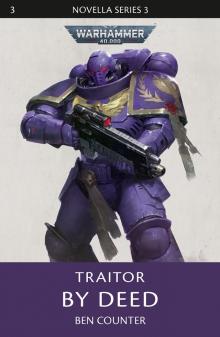 Traitor by Deed
Traitor by Deed Sacrifice
Sacrifice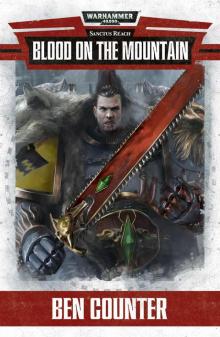 Blood on the Mountain
Blood on the Mountain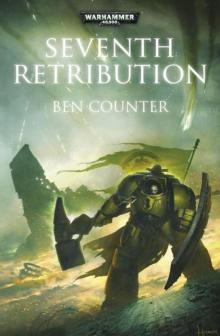 Seventh Retribution
Seventh Retribution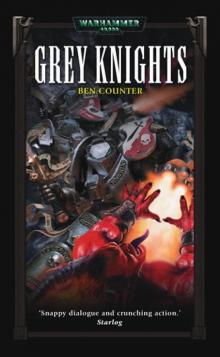 Grey Knights (Warhammer 40000)
Grey Knights (Warhammer 40000)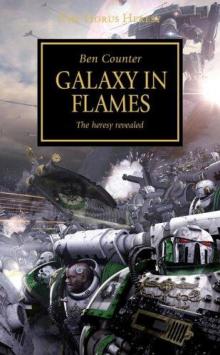 Galaxy in Flames
Galaxy in Flames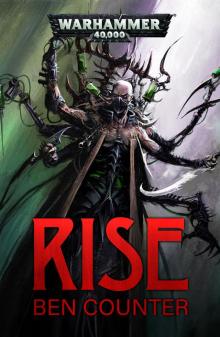 Rise – Ben Counter
Rise – Ben Counter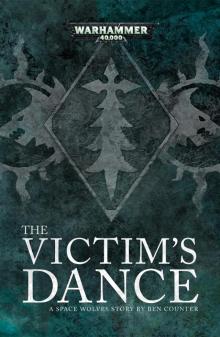 The Victim's Dance
The Victim's Dance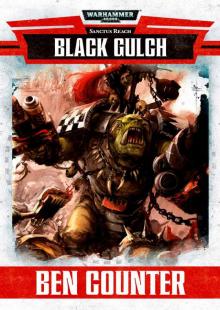 Black Gulch
Black Gulch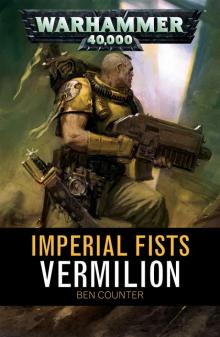 Vermilion
Vermilion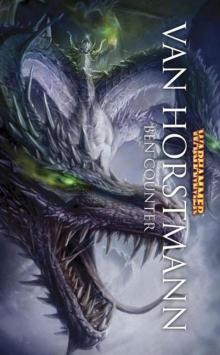 Van Horstmann
Van Horstmann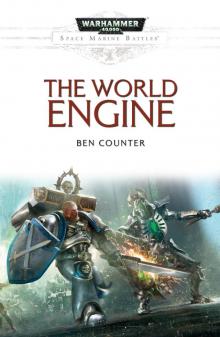 The World Engine
The World Engine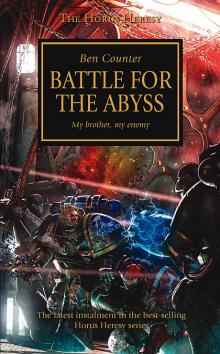 Battle for the Abyss
Battle for the Abyss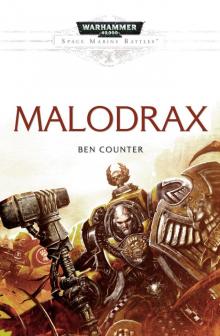 Malodrax
Malodrax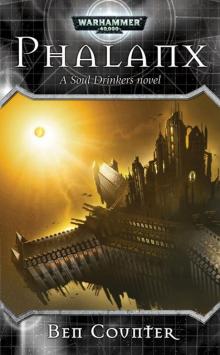 Soul Drinkers 06 - Phalanx
Soul Drinkers 06 - Phalanx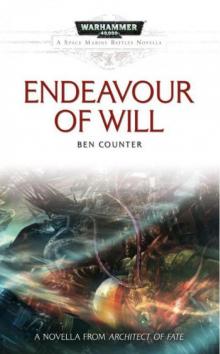 Endeavour of Will
Endeavour of Will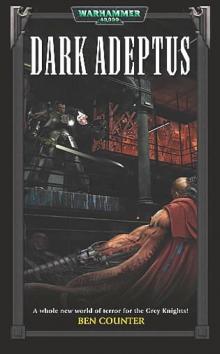 Dark Adeptus
Dark Adeptus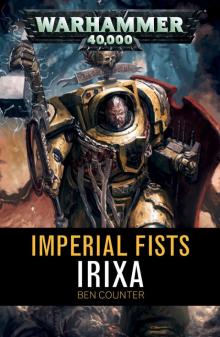 Irixa
Irixa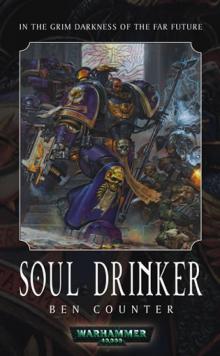 Soul Drinker
Soul Drinker